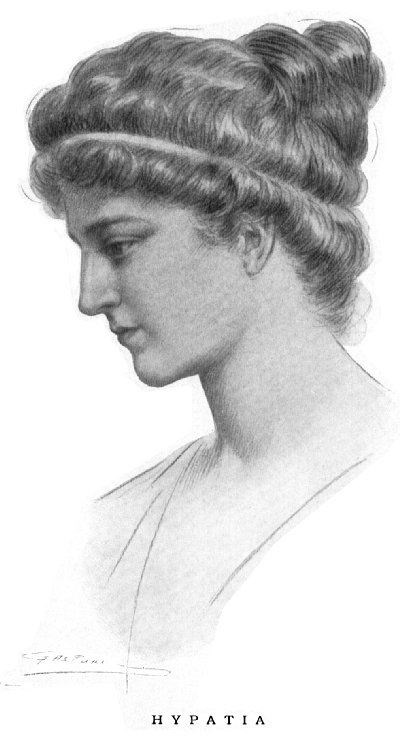 |
| Hypatia of Alexandria (http://www.feministezine.com/feminist/philosophy/images/Hypatia-02.jpg ()) |
Usually when someone mentions Hypatia of Alexandria, the other person asks: "Who's that?" Hypatia of Alexandria was the last great Alexandrian mathematician and philosopher. She was the first historically acknowledged woman mathematician. She was born around the year 370 AD to Theon of Alexandria; a Greek Scholar and mathematician himself. During that time period, women weren't acknowledged by society as they were expected to raise children and take care of the household. Hypatia's father, meanwhile, encouraged her to develop her intelligence and allowed her to study mathematics, the arts, literature, science, and philosophy. She was also encouraged by her father to not follow any religion, due to his belief that a religion would cloud her scientific mind. He told her "Reserve your right to think, for even to think wrongly is better than not to think at all".
Due to her father's influence, she became a supporter of Greek scientific rational thought. She traveled to Athens and Italy to further her studies with the brightest minds of that time. Around 400 AD, she became the head of the Platonist school in Alexandria. Students from all round the Ancient world traveled to Alexandria to attend her lectures on philosophy and mathematics. Hypatia's home later became an intellectual center for scholars to gather and discuss philosophical and scientific questions. Hypatia became a versatile and charismatic teacher who was respected by the scientific community. Hypatia invented the hydroscope, the first laboratory instrument to measure the specific gravity of liquid, which was considered a breakthrough in her time. Her most well known book was called the 'Arithmetica' which was a thirteen volume definitive study in algebra. She revolutionized mathematics in a way that helped her students better understand algebra and other parts of mathematics.
Around the year 415 AD, Christianity began to take over most of Alexandria, but Hypatia stayed true to her beliefs and wouldn't change her religious views. Riots began in the streets when Cyril, bishop of Alexandria ordered that all Jews stop harassing the Christians, but the Jews only grew more enraged with him, until one day, they resorted to violence against the Christians. One night, they ran down the streets, claiming that their church was on fire. When the Christians came out and responded to what they thought was the burning of their church, "the Jews immediately fell upon them and slew them" (Ecclesiastical History, by Socrates Scholasticus) using a ring to see each other in the dark, killing everyone they didn't recognize. Hypatia eventually fell "victim to the political jealousy which at the time prevailed" and she was later approached by a mob of Christians led by a minor cleric named Peter, who kidnapped and murdered her.
Although most of her writings were commentaries on the works of others, the community still owes Hypatia a great debt. She had succeeded where others had failed. In a time when women were barely noticed, she overcame the odds and instead of becoming a laughingstock to the scientific community, she became respected by both her students and her colleagues.
Page created on 11/25/2012 12:00:00 AM
Last edited 4/23/2019 12:00:38 AM
Adair, Ginny. "Biographies of Women Mathematicians~Hypatia." [Online] Available http://www.agnesscott.edu/lriddle/women/hypatia.htm.
Gill, N.S.. "Hypatia of Alexandria." [Online] Available http://ancienthistory.about.com/od/gm/a/100909Hypatia.htm.
Williams, Danielle. "The Life and Legacy of Hypatia." [Online] Available http://hem.bredband.net/b153434/Works/Hypatia.htm.
Vare, Ethlie Ann. "Female Inventors~Hypatia of Alexandria." [Online] Available http://www.inventions.org/culture/female/hypatia.html.
